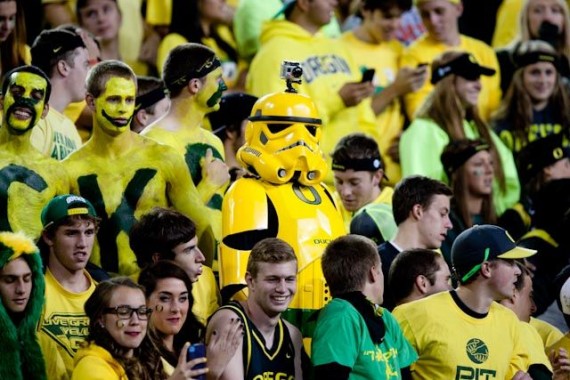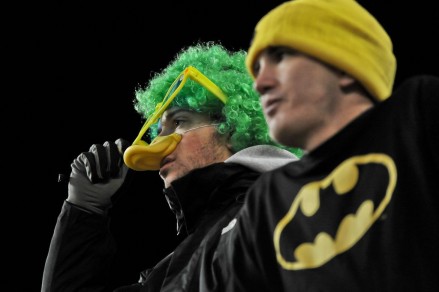feature photo courtesy of Amazing Moments
What is it about sports? What is this drive humans have to want to cheer on a team? Few fans personally know any of the players on their favorite team, so it isn’t as if there is a personal connection to cheer for. So why? Why do fans invest so much time, money, effort and emotion to root for players they do not know? Why do fans pick teams that aren’t from the same city, state or region? Why would someone from Texas root for the Ducks as if they were his or her local team?
Little research has been done on the psychology of sports fans. Virtually all the research that has been done has been directed at coaches or athletes, leaving this particular subject somewhat mysterious. Despite that, there are still some ideas and insights into why people feel this intense need to root for a team.
Early in human history, humans formed tribes, and neighboring tribes could be hostile or friendly. If that tribe was hostile, there would often be conflict, and it was in a tribal member’s best interest to cheer for his or her side. Their survival depended upon it. Move forward several thousand years, and the same imperative is still in place. Now it isn’t about survival, but it still feels like it is a matter of life or death.
Professor Robert Caldini of Arizona State University was the first to coin the term BIRG (Bask In Reflected Glory). He showed that when a team wins a game, the fans of that team feel good, and not just about the team, but about themselves as well. Fans identify with the team as if they had been on the field with them.
Fan self-esteem, self-image and confidence all rise when their team wins. Conversely, their self-worth plummets when that same team loses.
CORF-ing (Cutting Off Reflected Failure) is the phenomenon when fans react negatively to a team’s loss and ascribe the failure to the team, and not themselves. Certainly Beaver fans can relate to this.
A fan who is BIRG-ing: “Did you see the game last night? We kicked butt and won the game!”
A fan who is CORF-ing: “The Beavers lost to the Ducks again. They couldn’t hold on to the ball, pass or run.”
Men who watch their team win will often experience a marked increase in testosterone levels afterwards (women do not), and when that team loses, the testosterone decreases. So while fans generally know – on some level – that what they are watching is just a game, there is a deeper, subconscious side of them that believes it be real, and more importantly, personal.
There is more to being a sports fan than BIRG-ing, CORF-ing and tribal loyalties. Sports allow fans to lose their normal sense of inhibition. Whether watching a game in the stands, at the bar or at home, many fans relinquish their normal sense of control and social restrictions. They cheer with strangers, scream, yell and cry. Even normally reserved individuals will, when watching their beloved teams play, let go of their sense of what is appropriate or not.
Sports is also another way of feeling connected to a larger group of people – the fans of the same team. This is just another version of the tribal sense of belonging. This is also why fans high-five someone sitting next to them whom they do not know. They don’t have to know that person. They are both fans of the same team and therefore part of a larger family. A fan belongs when they are part of the group.
The reasons why a person becomes a fan are far more complex than any of the reasons listed above. Biology, evolution and survival all play parts in the recipe. Being a fan means being connected to an event that is bigger than their normal day-to-day experience. It gives the fan meaning and purpose, even if the game itself has very little outward value. Sure, it is just a game, but inwardly, it means so much more.
Fans don’t tend to think about why they are a follower of their respective team. It is something that simply is. They cheer when they win, moan and cry and get depressed when they lose and rarely ask themselves what is driving this inexplicable passion. Yet perhaps they should. The answers lead to something that is far more profound than understanding what it means to be a fan: The answers lead to what it means to be human.
Related Articles:
Chip Kelly Update: Everything's Good Again ...
Chip Kelly Update: Wailing and Gnashing of Teeth
Shock and Awe -- The Oregon Ducks' Football Hangover Effect
Despite Lopsided Score, Georgia State "Never Stopped Believing"
Hope Springs Eternal for Ducks
Incompetent Pac-12 Officials: How Do You Miss ALL of THIS?
Don Gilman is a second-year communications major at Umpqua Community College in Roseburg, Oregon. In addition to writing for FishDuck.com, he has been published in the Roseburg News-Review Newspaper, the UCC Mainstream Newspaper, Bucketlist Publications and is the featured author in the June, 2013 edition of eHorror magazine (under a pseudonym.) In 2013 Don received two awards from the Oregon Newspaper Association’s annual statewide college competition: Third place for Best Feature Story and second place for Best Spot Photography.


